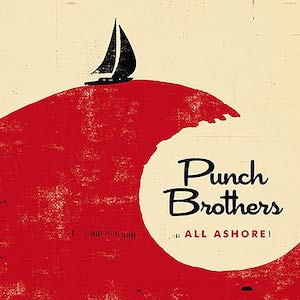 Punch Brothers – All Ashore
Punch Brothers – All Ashore
Nonesuch – 20 July 2018
Ever since their formation in 2006, the Punch Brothers have been sold as something of a progressive-bluegrass supergroup, and over the 12 years since then, they’ve continued to push the boundaries of even that loose sub-genre, far and away into what is latterly been dubbed avant-roots. For anyone thus far still unacquainted with the quintet, there are no brothers involved, although the symbiotic bond between the five musicians is extraordinarily brother-like. Also, none of the members are named (or nicknamed) Punch, but their music packs a considerable punch. The ensemble work is by any standards remarkable, both in terms of instrumental chops and natural vocal interaction.
Punch Brothers’ lineup comprises Chris Thile (mandolin, lead vocals), Gabe Witcher (fiddle), Noam Pikelny (banjo), Chris Eldridge (guitar) and Paul Kowert (bass). Their 2015 album The Phosphorescent Blues (produced by T Bone Burnett, no less) was a thought-provoking statement which also made good musical sense, introducing into the already stimulating musical mix of bluegrass, newgrass and progressive jazz elements of 20th century and contemporary chamber-classical and esoteric pop invention. Its followup All Ashore, while a consolidation of these elements, takes the band’s keen envelope-pushing a stage further, while at the same time being (perhaps more obliquely) informed by all the various side-projects with which its members had been involved in the intervening years. It tells too, that the band is completely at ease in the studio (specifically, the same studio they’ve used for the two previous records), and having established a rapport with the space, they’ve taken the decision to self-produce this new album.
Although Punch Brothers have always used the bluegrass idiom as a basic springboard, they quickly launch off into other musical directions with a scintillating combination of inevitability and discovery. Their songs are informed not so much by the values and concerns of tradition as by how their themes apply to this digital age with its pervasive (and disturbing) sense of isolation despite community. In essence, the album is, in the words of Chris Thile himself: “a meditation on committed relationships in the present day, particularly in the present political climate”. Edgy sentiments, set to edgy rhythms that constantly wrongfoot convention and expectation, that is until you get used to being in tune with the pulse of these songs. A clear case of sense and sensibility, one might say.
The album’s lengthiest opus is its calling-card seven-minute title track, whose gently episodic nature weaves its own intriguing pattern in words and music and demands instant repeat play for further revealing detail to emerge. The Angel Of Doubt also trades off an insistent ostinato riff that in rock would be heavy weather; here, it only serves to accentuate its trade-off with the jazzy spiralling vocal line and curiously irregular thought processes (for all that they originate from a fairly straightforward situational premise); the riff and the rap coincide pointedly on the song’s final section. The cheekily biting character-portrait Jumbo is delicious fun, set to an infectious bouncy, funky strut and displaying abundant humour in the playing. In contrast, the deeply reflective commentary of The Gardener provides a disc highlight of a different kind, another lesson in pared-down excellence where every note and ripple speaks volumes and beautifully complements the tender vocal phrasing to reinforce the song’s important message. Even the final song, Like It’s Going Out Of Style, has a live-for-the-moment urgency – and optimism – to its deliberate tread.
Considering the guys’ brilliant musicianship, it might come as a surprise that All Ashore only contains two instrumental cuts. The first of these, Three Dots And A Dash, employs a tricky, spiky time-signature that could in lesser hands be just an excuse for some soulless note-spinning, but here we get a masterclass in light and shade, with dynamic levels reined in and kept low until the piece’s cutting final stages. This is virtuosity of an altogether classier kind – but that’s not to say Punch Brothers can’t let rip with the whirlwind lightning picking and bowing when the music demands – as on the disc’s second instrumental, Jungle Bird, which blows through like a fierce tornado but one that’s supremely controlled, funnelled, targeted and with no spillage of surplus energy outside of its track.
I will say this tho’ – and not in the way of adverse criticism – that in showcasing Punch Brothers’ increasingly developing songwriting craft there’s less in the way of overt expansion of influences and idioms on All Ashore compared to its predecessor, on which the band had worn 20th century impressionism and neo-classicism on their sleeves somewhat with their precision remodellings of original works by Scriabin and Debussy and seemed to be taking more chances in comparison (with gambits like that album’s episodic ten-minute opener Familiarity). This time around, the shadow of Debussy is arguably more subliminally present, almost out of the corner of the ear. Similarly, for all their virtuosity, the musicians all exercise considerable restraint in their playing, with an unerring sense of dynamics that gains even more through its unbridled natural spontaneity and unstinting crispness of execution.
A special glory of Punch Brothers’ music-making is that for all it embraces a melting-pot of influences it always feels organically driven and not like a melting-pot in the usual sense of just-toss-it-all-in-and-see-what-happens. It’s intimate and inclusive, and the listener feels privileged to be in on the five musicians’ private session.

